《兰亭集序》(林语堂两种英文翻译版本)
- 格式:pdf
- 大小:69.37 KB
- 文档页数:2
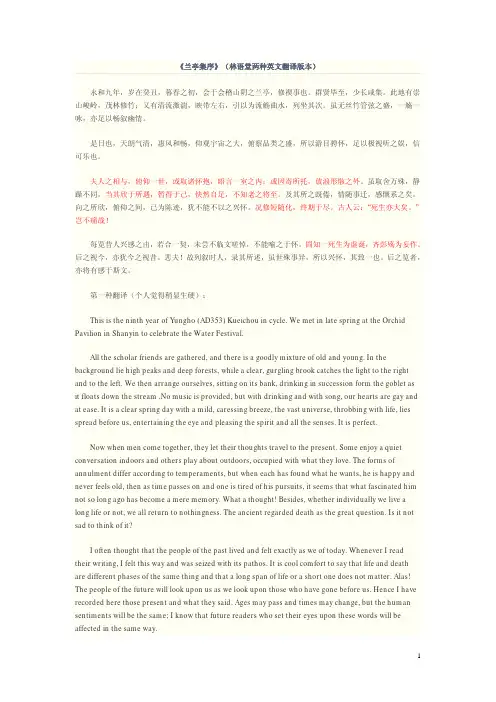
《兰亭集序》(林语堂两种英文翻译版本)永和九年,岁在癸丑,暮春之初,会于会稽山阴之兰亭,修禊事也。
群贤毕至,少长咸集。
此地有崇山峻岭,茂林修竹;又有清流激湍,映带左右,引以为流觞曲水,列坐其次。
虽无丝竹管弦之盛,一觞一咏,亦足以畅叙幽情。
是日也,天朗气清,惠风和畅,仰观宇宙之大,俯察品类之盛,所以游目骋怀,足以极视听之娱,信可乐也。
夫人之相与,俯仰一世,或取诸怀抱,晤言一室之内;或因寄所托,放浪形骸之外。
虽取舍万殊,静躁不同,当其欣于所遇,暂得于己,快然自足,不知老之将至。
及其所之既倦,情随事迁,感慨系之矣。
向之所欣,俯仰之间,已为陈迹,犹不能不以之兴怀。
况修短随化,终期于尽。
古人云:“死生亦大矣。
”岂不痛哉!每览昔人兴感之由,若合一契,未尝不临文嗟悼,不能喻之于怀。
固知一死生为虚诞,齐彭殇为妄作。
后之视今,亦犹今之视昔。
悲夫!故列叙时人,录其所述,虽世殊事异,所以兴怀,其致一也。
后之览者,亦将有感于斯文。
第一种翻译(个人觉得稍显生硬):This is the ninth year of Yungho (AD353) Kueichou in cycle. We met in late spring at the Orchid Pavilion in Shanyin to celebrate the Water Festival.All the scholar friends are gathered, and there is a goodly mixture of old and young. In the background lie high peaks and deep forests, while a clear, gurgling brook catches the light to the right and to the left. We then arrange ourselves, sitting on its bank, drinking in succession form the goblet as it floats down the stream .No music is provided, but with drinking and with song, our hearts are gay and at ease. It is a clear spring day with a mild, caressing breeze, the vast universe, throbbing with life, lies spread before us, entertaining the eye and pleasing the spirit and all the senses. It is perfect.Now when men come together, they let their thoughts travel to the present. Some enjoy a quiet conversation indoors and others play about outdoors, occupied with what they love. The forms of annulment differ according to temperaments, but when each has found what he wants, he is happy and never feels old, then as time passes on and one is tired of his pursuits, it seems that what fascinated him not so long ago has become a mere memory. What a thought! Besides, whether individually we live a long life or not, we all return to nothingness. The ancient regarded death as the great question. Is it not sad to think of it?I often thought that the people of the past lived and felt exactly as we of today. Whenever I read their writing, I felt this way and was seized with its pathos. It is cool comfort to say that life and death are different phases of the same thing and that a long span of life or a short one does not matter. Alas! The people of the future will look upon us as we look upon those who have gone before us. Hence I have recorded here those present and what they said. Ages may pass and times may change, but the human sentiments will be the same; I know that future readers who set their eyes upon these words will be affected in the same way.下面是第二种翻译(这个版本可能更好):The Orchid PavilionIn the ninth year of the reign Yungho[A.D. 353] in the beginning of late spring we met at the Orchid Pavilion in Shanyin of Kweich'i for the Water Festival, to wash away the evil spirits.Here are gathered all the illustrious persons and assembled both the old and the young. Here aretall mountains and majestic peaks, trees with thick foliage and tall bamboos. Here are also clear streams and gurgling rapids, catching one's eye from the right and left. We group ourselves in order, sitting by the waterside, and drinking in succession from a cup floating down the curving stream; and although there is no music from string and wood-wind instruments, yet with alternate singing and drinking, we are well disposed to thoroughly enjoy a quiet intimate conversation.Today the sky is clear, the air is fresh and the kind breeze is mild. Truly enjoyable it is sit to watch the immense universe above and the myriad things below, traveling over the entire landscape with our eyes and allowing our sentiments to roam about at will, thus exhausting the pleasures of the eye and the ear.Now when people gather together to surmise life itself, some sit and talk and unburden their thoughts in the intimacy of a room, and some, overcome by a sentiment, soar forth into a world beyond bodily realities. Although we select our pleasures according to our inclinations—some noisy and rowdy, and others quiet and sedate—yet when we have found that which pleases us, we are all happy and contented, to the extent of forgetting that we are growing old. And then, when satiety follows satisfaction, and with the change of circumstances, change also our whims and desires, there then arises a feeling of poignant regret. In the twinkling of an eye, the objects of our former pleasures have become things of the past, still compelling in us moods of regretful memory. Furthermore, although our lives may be long or short, eventually we all end in nothingness. "Great indeed are life and death", said the ancients. Ah! What sadness!I often study the joys and regrets of the ancient people, and as I lean over their writings and see that they were moved exactly as ourselves, I am often overcome by a feeling of sadness and compassion, and would like to make those things clear to me. Well I know it is a lie to say that life and death are the same thing, and that longevity and early death make no difference! Alas! As we of the present look upon those of the past, so will posterity look upon our present selves. Therefore, have I put down a sketch of these contemporaries and their sayings at this feast, and although time and circumstances may change, the way they will evoke our moods of happiness and regret will remain the same. What will future readers feel when they cast their eyes upon this writing.。
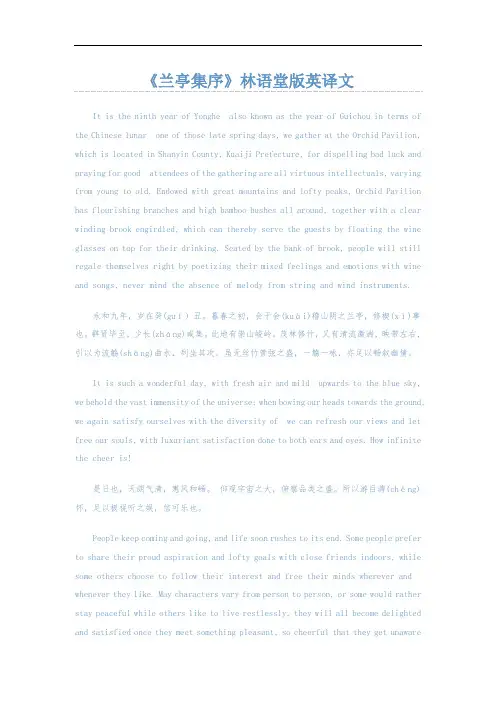
It is the ninth year of Yonghe also known as the year of Guichou in terms of the Chinese lunar one of those late spring days, we gather at the Orchid Pavilion, which is located in Shanyin County, Kuaiji Prefecture, for dispelling bad luck and praying for good attendees of the gathering are all virtuous intellectuals, varying from young to old. Endowed with great mountains and lofty peaks, Orchid Pavilion has flourishing branches and high bamboo bushes all around, together with a clear winding brook engirdled, which can thereby serve the guests by floating the wine glasses on top for their drinking. Seated by the bank of brook, people will still regale themselves right by poetizing their mixed feelings and emotions with wine and songs, never mind the absence of melody from string and wind instruments.永和九年,岁在癸(guǐ)丑。

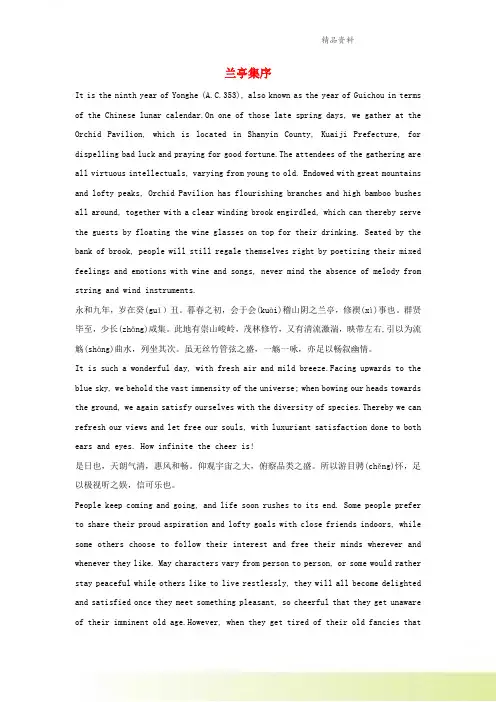
兰亭集序It is the ninth year of Yonghe (A.C.353), also known as the year of Guichou in terms of the Chinese lunar calendar.On one of those late spring days, we gather at the Orchid Pavilion, which is located in Shanyin County, Kuaiji Prefecture, for dispelling bad luck and praying for good fortune.The attendees of the gathering are all virtuous intellectuals, varying from young to old. Endowed with great mountains and lofty peaks, Orchid Pavilion has flourishing branches and high bamboo bushes all around, together with a clear winding brook engirdled, which can thereby serve the guests by floating the wine glasses on top for their drinking. Seated by the bank of brook, people will still regale themselves right by poetizing their mixed feelings and emotions with wine and songs, never mind the absence of melody from string and wind instruments.永和九年,岁在癸(guǐ)丑。
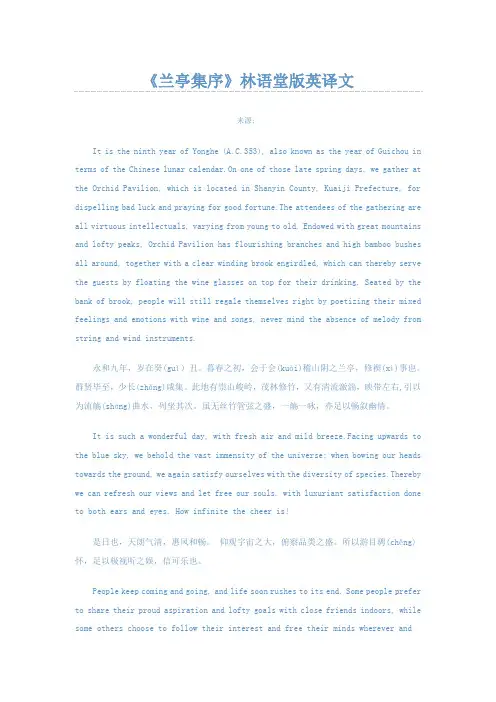
《兰亭集序》林语堂版英译文来源:It is the ninth year of Yonghe (A.C.353), also known as the year of Guichou in terms of the Chinese lunar calendar.On one of those late spring days, we gather at the Orchid Pavilion, which is located in Shanyin County, Kuaiji Prefecture, for dispelling bad luck and praying for good fortune.The attendees of the gathering are all virtuous intellectuals, varying from young to old. Endowed with great mountains and lofty peaks, Orchid Pavilion has flourishing branches and high bamboo bushes all around, together with a clear winding brook engirdled, which can thereby serve the guests by floating the wine glasses on top for their drinking. Seated by the bank of brook, people will still regale themselves right by poetizing their mixed feelings and emotions with wine and songs, never mind the absence of melody from string and wind instruments.永和九年,岁在癸(guǐ)丑。
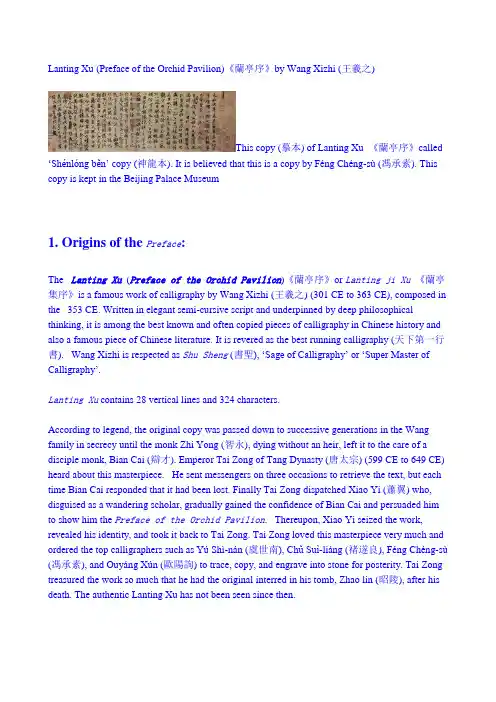
Lanting Xu (Preface of the Orchid Pavilion)《蘭亭序》by Wang Xizhi (王羲之)This copy (摹本) of Lanting Xu 《蘭亭序》called ‘Shénlóng běn’ copy (神龍本). It is believed that this is a copy by Féng Chéng-sù (馮承素). This copy is kept in the Beijing Palace Museum1. Origins of the Preface:The Lanting Xu(Preface of the Orchid Pavilion)《蘭亭序》or Lanting ji Xu《蘭亭集序》is a famous work of calligraphy by Wang Xizhi (王羲之) (301 CE to 363 CE), composed in the 353 CE. Written in elegant semi-cursive script and underpinned by deep philosophical thinking, it is among the best known and often copied pieces of calligraphy in Chinese history and also a famous piece of Chinese literature. It is revered as the best running calligraphy (天下第一行書). Wang Xizhi is respected as Shu Sheng (書聖), ‘Sage of Calligraphy’ or ‘Super Master ofC alligraphy’.Lanting Xu contains 28 vertical lines and 324 characters.According to legend, the original copy was passed down to successive generations in the Wang family in secrecy until the monk Zhi Yong (智永), dying without an heir, left it to the care of a disciple monk, Bian Cai (辯才). Emperor Tai Zong of Tang Dynasty (唐太宗) (599 CE to 649 CE) heard about this masterpiece. He sent messengers on three occasions to retrieve the text, but each time Bian Cai responded that it had been lost. Finally Tai Zong dispatched Xiao Yi (蕭翼) who, disguised as a wandering scholar, gradually gained the confidence of Bian Cai and persuaded him to show him the Preface of the Orchid Pavilion. Thereupon, Xiao Yi seized the work, revealed his identity, and took it back to Tai Zong. Tai Zong loved this masterpiece very much and ordered the top calligraphers such as Yú Shì-nán (虞世南), Chǔ Suì-liáng (褚遂良), Féng Chéng-sù(馮承素), and Ouyáng Xún (歐陽詢) to trace, copy, and engrave into stone for posterity. Tai Zong treasured the work so much that he had the original interred in his tomb, Zhao lin (昭陵), after his death. The authentic Lanting Xu has not been seen since then.2. The occasion – Xiu xi (修禊):Xiū xì (修禊) was a purification ritual to ward off the evil spirit and bring good fortune. It took place on the third day of the Third Lunar Month. Wang Xizhi (王羲之) composed and wrote this masterpiece on this day of purification ritual in 353 CE (1662 years ago).This ritual is no longer celebrated widely in China today but the event is still commemorated in Shaoxing (紹興), the original place. Scholars still practise it in Lanting every year. Japanese scholars and elites also commemorate the event on that day, in particular in 60th year anniversaries when the lunar year coincides with the year 癸丑1913, 1973, 2033. In 1973 there was a great exhibition in Japan of everything related to Lanting, and a good catalogue was published.In 2015, this day falls on 21 April (Tuesday).3. Translation:永和九年,歲在癸丑,暮春之初,會於會稽山陰之蘭亭,脩稧事也。
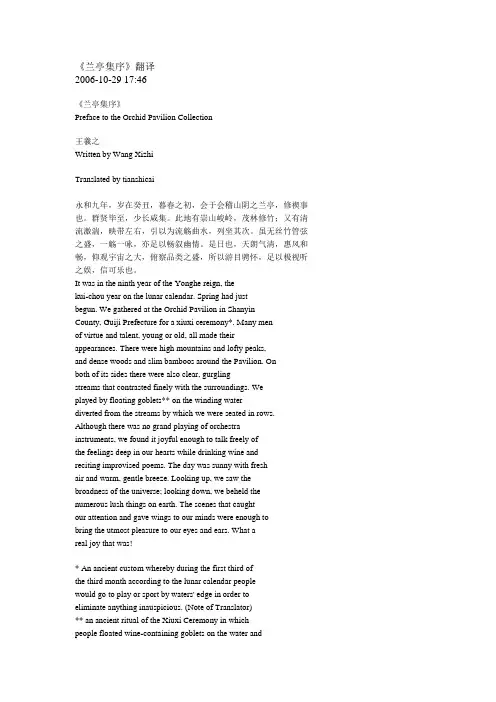
《兰亭集序》翻译2006-10-29 17:46《兰亭集序》Preface to the Orchid Pavilion Collection王羲之Written by Wang XizhiTranslated by tianshicai永和九年,岁在癸丑,暮春之初,会于会稽山阴之兰亭,修禊事也。
群贤毕至,少长咸集。
此地有崇山峻岭,茂林修竹;又有清流激湍,映带左右,引以为流觞曲水,列坐其次。
虽无丝竹管弦之盛,一觞一咏,亦足以畅叙幽情。
是日也,天朗气清,惠风和畅,仰观宇宙之大,俯察品类之盛,所以游目骋怀,足以极视听之娱,信可乐也。
It was in the ninth year of the Yonghe reign, thekui-chou year on the lunar calendar. Spring had justbegun. We gathered at the Orchid Pavilion in ShanyinCounty, Guiji Prefecture for a xiuxi ceremony*. Many menof virtue and talent, young or old, all made theirappearances. There were high mountains and lofty peaks,and dense woods and slim bamboos around the Pavilion. Onboth of its sides there were also clear, gurglingstreams that contrasted finely with the surroundings. Weplayed by floating goblets** on the winding waterdiverted from the streams by which we were seated in rows. Although there was no grand playing of orchestrainstruments, we found it joyful enough to talk freely ofthe feelings deep in our hearts while drinking wine andreciting improvised poems. The day was sunny with freshair and warm, gentle breeze. Looking up, we saw thebroadness of the universe; looking down, we beheld thenumerous lush things on earth. The scenes that caughtour attention and gave wings to our minds were enough tobring the utmost pleasure to our eyes and ears. What areal joy that was!* An ancient custom whereby during the first third ofthe third month according to the lunar calendar peoplewould go to play or sport by waters' edge in order toeliminate anything inauspicious. (Note of Translator)** an ancient ritual of the Xiuxi Ceremony in whichpeople floated wine-containing goblets on the water andpicked those held back at the turns for drinking.(Noteof Translator)夫人之相与,俯仰一世,或取诸怀抱,晤言一室之内;或因寄所托,放浪形骸之外。
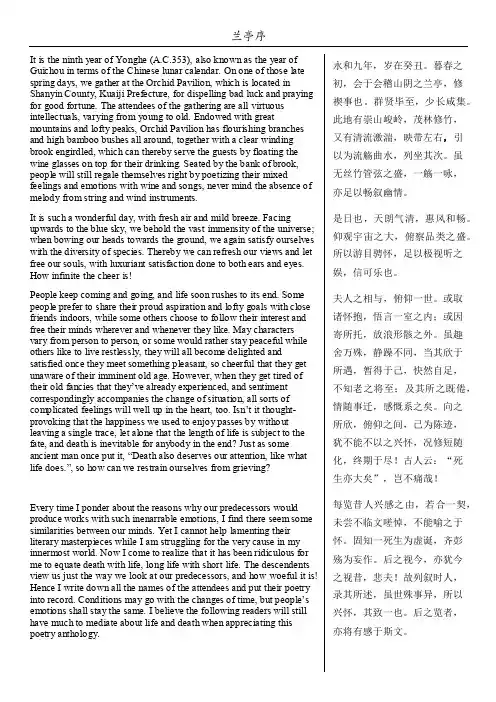
兰亭序It is the ninth year of Yonghe (A.C.353), also known as the year of Guichou in terms of the Chinese lunar calendar. On one of those late spring days, we gather at the Orchid Pavilion, which is located in Shanyin County, Kuaiji Prefecture, for dispelling bad luck and praying for good fortune. The attendees of the gathering are all virtuous intellectuals, varying from young to old. Endowed with great mountains and lofty peaks, Orchid Pavilion has flourishing branches and high bamboo bushes all around, together with a clear winding brook engirdled, which can thereby serve the guests by floating the wine glasses on top for their drinking. Seated by the bank of brook, people will still regale themselves right by poetizing their mixed feelings and emotions with wine and songs, never mind the absence of melody from string and wind instruments.It is such a wonderful day, with fresh air and mild breeze. Facing upwards to the blue sky, we behold the vast immensity of the universe; when bowing our heads towards the ground, we again satisfy ourselves with the diversity of species. Thereby we can refresh our views and let free our souls, with luxuriant satisfaction done to both ears and eyes. How infinite the cheer is!People keep coming and going, and life soon rushes to its end. Some people prefer to share their proud aspiration and lofty goals with close friends indoors, while some others choose to follow their interest and free their minds wherever and whenever they like. May charactersvary from person to person, or some would rather stay peaceful while others like to live restlessly, they will all become delighted and satisfied once they meet something pleasant, so cheerful that they get unaware of their imminent old age. However, when they get tired of their old fancies that they’ve already experienced, and sentiment correspondingly accompanies the change of situation, all sorts of complicated feelings will well up in the heart, too. Isn’t it thought-provoking that the happiness we used to enjoy passes by without leaving a single trace, let alone that the length of life is subject to the fate, and death is inevitable for anybody in the end? Just as some ancient man once put it, “Death also deserves our attention, like what life does.”, so how can we restrain our selves from grieving?Every time I ponder about the reasons why our predecessors would produce works with such inenarrable emotions, I find there seem some similarities between our minds. Yet I cannot help lamenting their literary masterpieces while I am struggling for the very cause in my innermost world. Now I come to realize that it has been ridiculous for me to equate death with life, long life with short life. The descendents view us just the way we look at our predecessors, and how woeful it is! Hence I write down all the names of the attendees and put their poetry into record. Conditions may go with the changes of time, but people’s emotions shall stay the same. I believe the following readers will still have much to mediate about life and death when appreciating this poetry anthology. 永和九年,岁在癸丑。
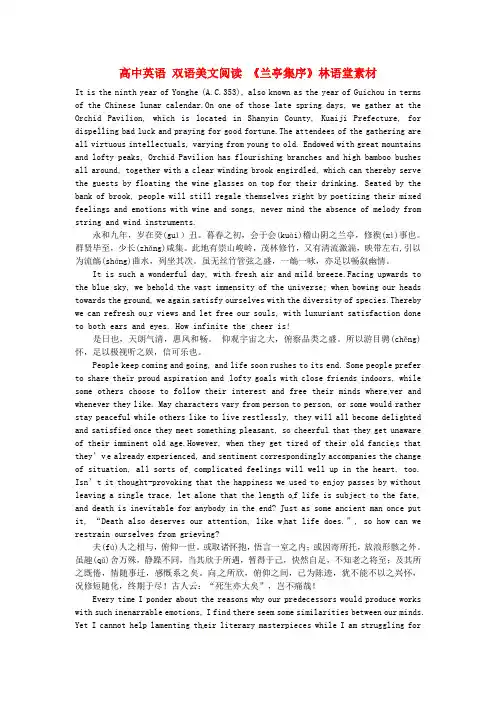
高中英语双语美文阅读《兰亭集序》林语堂素材It is the ninth year of Yonghe (A.C.353), also known as the year of Guichou in terms of the Chinese lunar calendar.On one of those late spring days, we gather at the Orchid Pavilion, which is located in Shanyin County, Kuaiji Prefecture, for dispelling bad luck and praying for good fortune.The attendees of the gathering are all virtuous intellectuals, varying from young to old. Endowed with great mountains and lofty peaks, Orchid Pavilion has flourishing branches and high bamboo bushes all around, together with a clear winding brook engirdled, which can thereby serve the guests by floating the wine glasses on top for their drinking. Seated by the bank of brook, people will still regale themselves right by poetizing their mixed feelings and emotions with wine and songs, never mind the absence of melody from string and wind instruments.永和九年,岁在癸(guǐ)丑。
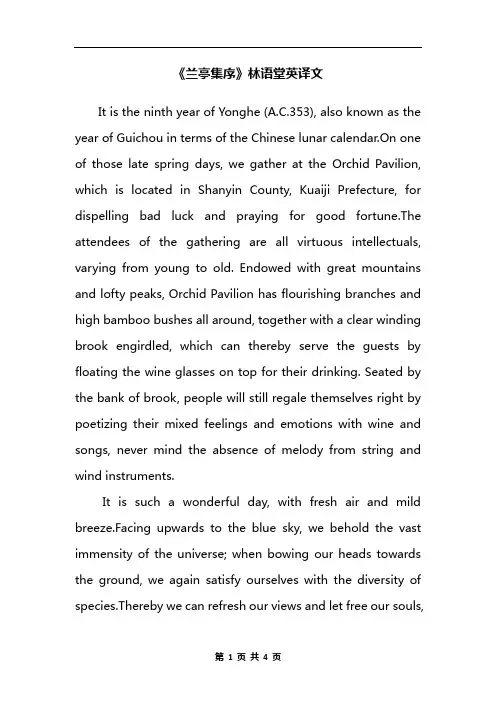
《兰亭集序》林语堂英译文It is the ninth year of Yonghe (A.C.353), also known as the year of Guichou in terms of the Chinese lunar calendar.On one of those late spring days, we gather at the Orchid Pavilion, which is located in Shanyin County, Kuaiji Prefecture, for dispelling bad luck and praying for good fortune.The attendees of the gathering are all virtuous intellectuals, varying from young to old. Endowed with great mountains and lofty peaks, Orchid Pavilion has flourishing branches and high bamboo bushes all around, together with a clear winding brook engirdled, which can thereby serve the guests by floating the wine glasses on top for their drinking. Seated by the bank of brook, people will still regale themselves right by poetizing their mixed feelings and emotions with wine and songs, never mind the absence of melody from string and wind instruments.It is such a wonderful day, with fresh air and mild breeze.Facing upwards to the blue sky, we behold the vast immensity of the universe; when bowing our heads towards the ground, we again satisfy ourselves with the diversity of species.Thereby we can refresh our views and let free our souls,with luxuriant satisfaction done to both ears and eyes. How infinite the cheer is!永和九年,岁正在癸(guǐ)丑。
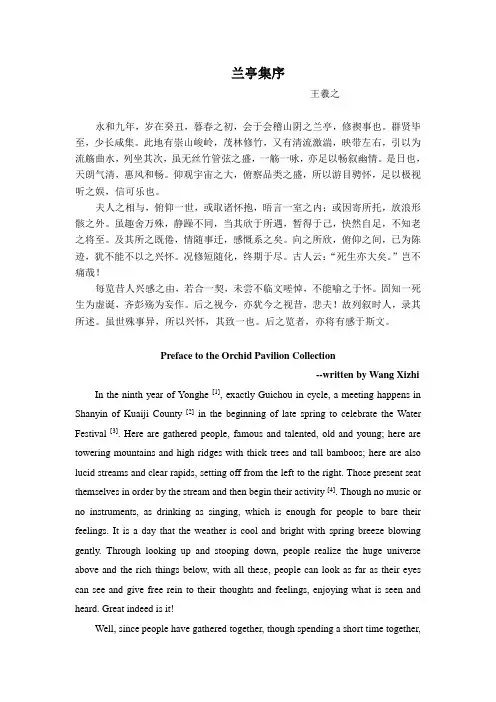
兰亭集序王羲之永和九年,岁在癸丑,暮春之初,会于会稽山阴之兰亭,修禊事也。
群贤毕至,少长咸集。
此地有崇山峻岭,茂林修竹,又有清流激湍,映带左右,引以为流觞曲水,列坐其次,虽无丝竹管弦之盛,一觞一咏,亦足以畅叙幽情。
是日也,天朗气清,惠风和畅。
仰观宇宙之大,俯察品类之盛,所以游目骋怀,足以极视听之娱,信可乐也。
夫人之相与,俯仰一世,或取诸怀抱,晤言一室之内;或因寄所托,放浪形骸之外。
虽趣舍万殊,静躁不同,当其欣于所遇,暂得于己,快然自足,不知老之将至。
及其所之既倦,情随事迁,感慨系之矣。
向之所欣,俯仰之间,已为陈迹,犹不能不以之兴怀。
况修短随化,终期于尽。
古人云:“死生亦大矣。
”岂不痛哉!每览昔人兴感之由,若合一契,未尝不临文嗟悼,不能喻之于怀。
固知一死生为虚诞,齐彭殇为妄作。
后之视今,亦犹今之视昔,悲夫!故列叙时人,录其所述。
虽世殊事异,所以兴怀,其致一也。
后之览者,亦将有感于斯文。
Preface to the Orchid Pavilion Collection--written by Wang Xizhi In the ninth year of Yonghe [1], exactly Guichou in cycle, a meeting happens in Shanyin of Kuaiji County [2]in the beginning of late spring to celebrate the Water Festival [3]. Here are gathered people, famous and talented, old and young; here are towering mountains and high ridges with thick trees and tall bamboos; here are also lucid streams and clear rapids, setting off from the left to the right. Those present seat themselves in order by the stream and then begin their activity [4]. Though no music or no instruments, as drinking as singing, which is enough for people to bare their feelings. It is a day that the weather is cool and bright with spring breeze blowing gently. Through looking up and stooping down, people realize the huge universe above and the rich things below, with all these, people can look as far as their eyes can see and give free rein to their thoughts and feelings, enjoying what is seen and heard. Great indeed is it!Well, since people have gathered together, though spending a short time together,some speak their bosom freely, sitting face to face to talk, and some take advantage of other things like wine or mountains to express their emotions, being opened-minded and unruly beyond bodily realities. Although people make different choices according to their silent or restless temperaments, yet when they have met what they like, no matter the time might be short, they’ll feel happy and contented, so excited that forget they would become old. Until they are tired of their pursuits and with things changing, change also their feelings. Because of the prosperity, they would like to look forward of their pursuits, however, in the twinkling of an eye, what they like would have become old, no wonder why their feelings would be changing with the circumstances changing! Moreover, it is natural that their lives should be long or short, an end would become in the end. The ancients said: “Death is great, life too.” Isn’t it sad?When studying the joys or sadness of the ancients, if the reasons are the same like a piece of Qi [5], it is natural that people have some feelings when reading those writings; it is natural that people should understand the writings in their hearts. Well, it is fantastic to consider death and life as the same thing, and it is absurd to equate longevity with early death. Alas! The posterity will look upon the present people just like the present people look upon the ancients. Thus, it is necessary to record the people present and write down the poems. Although times and things may differ, moods and feelings what they have in their hearts will be the same. Furthermore, the future readers will also affect by these writings.[1] It is 353AD.[2] Today it is Shaoxing in Zhejiang.[3] A memorial ceremony happens on the third day of March every year by the riversor streams to wash away the evil spirits.[4] That is: a cup filled with wine is floating down the curving stream, when it comesto the front of someone, he can take it and drink it but he should sing a poem at once.[5] A kind of contract is divided into two parts, which is made of bamboo or wood, itis a proof if the two parts can coincide with each other.-------translated by Liu Yanhui。
兰亭集序It is the ninth year of Yonghe (A.C.353), also known as the year of Guichou in terms of the Chinese lunar calendar.On one of those late spring days, we gather at the Orchid Pavilion, which is located in Shanyin County, Kuaiji Prefecture, for dispelling bad luck and praying for good fortune.The attendees of the gathering are all virtuous intellectuals, varying from young to old. Endowed with great mountains and lofty peaks, Orchid Pavilion has flourishing branches and high bamboo bushes all around, together with a clear winding brook engirdled, which can thereby serve the guests by floating the wine glasses on top for their drinking. Seated by the bank of brook, people will still regale themselves right by poetizing their mixed feelings and emotions with wine and songs, never mind the absence of melody from string and wind instruments.永和九年,岁在癸(guǐ)丑。
It is the ninth year of Yonghe also known as the year of Guichou in terms of the Chinese lunar one of those late spring days, we gather at the Orchid Pavilion, which is located in Shanyin County, Kuaiji Prefecture, for dispelling bad luck and praying for good attendees of the gathering are all virtuous intellectuals, varying from young to old. Endowed with great mountains and lofty peaks, Orchid Pavilion has flourishing branches and high bamboo bushes all around, together with a clear winding brook engirdled, which can thereby serve the guests by floating the wine glasses on top for their drinking. Seated by the bank of brook, people will still regale themselves right by poetizing their mixed feelings and emotions with wine and songs, never mind the absence of melody from string and wind instruments.永和九年,岁在癸(guǐ)丑。
The Orchid PavilionIn the ninth year of the reign Yunghe[A.D. 353] in the beginning of late spring we met at the Orchid Pavilion in Shanyin of Kweich'i for the Water Festival, to wash away the evil spirits. Here are gathered all the illustrious persons and assembled both the old and the young. Here are tall mountains and majestic peaks, trees with thick foliage and tall bamboos. Here are also clear streams and gurgling rapids, catching one's eye from the right and left. We group ourselves in order, sitting by the waterside, and drinking in succession from a cup floating down the curving stream; and although there is no music from string and wood-wind instruments, yet with alternate singing and drinking, we are well disposed to thoroughly enjoy a quiet intimate conversation. Today the sky is clear, the air is fresh and the kind breeze is mild. Truly enjoyable it is sit to watch the immense universe above and the myriad things below, traveling over the entire landscape with our eyes and allowing our sentiments to roam about at will, thus exhausting the pleasures of the eye and the ear. Now when people gather together to surmise life itself, some sit and talk and unburden their thoughts in the intimacy of a room, andsome, overcome by a sentiment, soar forth into a world beyond bodily realities. Although we select our pleasures according to our inclinations—some noisy and rowdy, and others quiet and sedate—yet when we have found that which pleases us, we are all happy and contented, to the extent of forgetting that we are growing old. And then, when satiety follows satisfaction, and with the change of circumstances, change also our whims and desires, there then arises a feeling of poignant regret. In the twinkling of an eye, the objects of our former pleasures have become things of the past, still compelling in us moods of regretful memory. Furthermore, although our lives may be long or short, eventually we all end in nothingness. "Great indeed are life and death", said the ancients. Ah! What sadness!“永和九年,岁在癸丑,暮春之初,会于会稽山阴之兰亭,修禊事也。
兰亭集序It is the ninth year of Yonghe (A.C.353), also known as the year of Guichou in terms of the Chinese lunar calendar.On one of those late spring days, we gather at the Orchid Pavilion, which is located in Shanyin County, Kuaiji Prefecture, for dispelling bad luck and praying for good fortune.The attendees of the gathering are all virtuous intellectuals, varying from young to old. Endowed with great mountains and lofty peaks, Orchid Pavilion has flourishing branches and high bamboo bushes all around, together with a clear winding brook engirdled, which can thereby serve the guests by floating the wine glasses on top for their drinking. Seated by the bank of brook, people will still regale themselves right by poetizing their mixed feelings and emotions with wine and songs, never mind the absence of melody from string and wind instruments.永和九年,岁在癸(guǐ〕丑。
兰亭集序It is the ninth year of Yonghe (A.C.353), also known as the year of Guichou in terms of the Chinese lunar calendar.On one of those late spring days, we gather at the Orchid Pavilion, which is located in Shanyin County, Kuaiji Prefecture, for dispelling bad luck and praying for good fortune.The attendees of the gathering are all virtuous intellectuals, varying from young to old. Endowed with great mountains and lofty peaks, Orchid Pavilion has flourishing branches and high bamboo bushes all around, together with a clear winding brook engirdled, which can thereby serve the guests by floating the wine glasses on top for their drinking. Seated by the bank of brook, people will still regale themselves right by poetizing their mixed feelings and emotions with wine and songs, never mind the absence of melody from string and wind instruments.永和九年,岁在癸(guǐ)丑。
兰亭集序英文翻译兰亭集序英文翻译Preface to the Collection of Poetry at Lan PavilionWang XizhiIt was the ninth year of Emperor Yonghe’s reign(A.D.353), which was also called Guichou according to the calculation of Chinese lunar year. On someday of the late spring, we gathered together at Lan pavilion in the Shanyin county of Kuaiji prefecture for dispelling bad luck and invoking happiness with waterside ablution. Soon, the pavilion was swarmed with the talented and the virtuous people from young to old. Here stood high hills and lofty peaks. All around were flourishing trees and erect bamboos. The clear creek, which engirdled Lan pavilion, was streaming gaily and reflecting sunshine around us. It was the engirdled creek that floated the wine cups among us to decide whose turn to poetize or drink. Although there were no melody feasts to the accompaniment of string and wind instruments as that in palaces, our wisdom was still content with sitting along the bank to poetize their helplessness and grief freely with wine. It was really a fine day with fresh air and gentle breeze.Glancing upward, we saw the empty immensity of sky. And when lowering our heads, we behold the golden prosperousness of species. All those views, which not only regaled our eyes but also opened our hearts, were totally enough to give us infinite joy and cheer.Every day people get along with each other aimlessly, and soon their lives are flying to an end. During the twinkling life, some prefer sharing the inner feelings with bosom friends indoors. And still others prefer travelling everywhere to free themselves from formality control after committing the souls tooutward objects. Though people would rather make different choices by their owns and meet different characters like peaceful or blundering, all of them will become delighted and satisfied the moment that they get what they want, only to forget that old age is just around the corner. However, when they become tired about what they have got, the movement of their sentiment will accompany the change of the outside world, and all kinds of feelings begin to well up in their hearts. There is no doubt that people will experience a pessimistic feeling after knowing the happiness has fleeted from the hands on the instant, let alone knowing the time people live is resigned to the fate and the death is inevitable for everybody in the end. The ancient once said, “Death is as important as life.” Isn't that each mortal’s sorrow?Every time I consider why ancestors wrote poems with some kind of mixed emotions, there always dwells in me a vague understanding like the bond existing between our ideas. And lamenting the ancestors’ writings becomes unavoidable though I can not tell the inner cause always. I know it is ridiculous and insincere to equate death with life. And I also know it is affected and absurd to give equal importance to the long-lived and short-lived. Descendants view us just as we do to ancestors, and how sad it is! Hence I have to write down the names of all present at Lan pavilion and copy out their poetry. Even if times has been changing and circumstances have been going by, I still believe human emotions are similar and future readers can also explore their insights like us while appreciating this collection of poetry.。
《兰亭集序》(林语堂两种英文翻译版本)永和九年,岁在癸丑,暮春之初,会于会稽山阴之兰亭,修禊事也。
群贤毕至,少长咸集。
此地有崇山峻岭,茂林修竹;又有清流激湍,映带左右,引以为流觞曲水,列坐其次。
虽无丝竹管弦之盛,一觞一咏,亦足以畅叙幽情。
是日也,天朗气清,惠风和畅,仰观宇宙之大,俯察品类之盛,所以游目骋怀,足以极视听之娱,信可乐也。
夫人之相与,俯仰一世,或取诸怀抱,晤言一室之内;或因寄所托,放浪形骸之外。
虽取舍万殊,静躁不同,当其欣于所遇,暂得于己,快然自足,不知老之将至。
及其所之既倦,情随事迁,感慨系之矣。
向之所欣,俯仰之间,已为陈迹,犹不能不以之兴怀。
况修短随化,终期于尽。
古人云:“死生亦大矣。
”岂不痛哉!每览昔人兴感之由,若合一契,未尝不临文嗟悼,不能喻之于怀。
固知一死生为虚诞,齐彭殇为妄作。
后之视今,亦犹今之视昔。
悲夫!故列叙时人,录其所述,虽世殊事异,所以兴怀,其致一也。
后之览者,亦将有感于斯文。
第一种翻译(个人觉得稍显生硬):This is the ninth year of Yungho (AD353) Kueichou in cycle. We met in late spring at the Orchid Pavilion in Shanyin to celebrate the Water Festival.All the scholar friends are gathered, and there is a goodly mixture of old and young. In the background lie high peaks and deep forests, while a clear, gurgling brook catches the light to the right and to the left. We then arrange ourselves, sitting on its bank, drinking in succession form the goblet as it floats down the stream .No music is provided, but with drinking and with song, our hearts are gay and at ease. It is a clear spring day with a mild, caressing breeze, the vast universe, throbbing with life, lies spread before us, entertaining the eye and pleasing the spirit and all the senses. It is perfect.Now when men come together, they let their thoughts travel to the present. Some enjoy a quiet conversation indoors and others play about outdoors, occupied with what they love. The forms of annulment differ according to temperaments, but when each has found what he wants, he is happy and never feels old, then as time passes on and one is tired of his pursuits, it seems that what fascinated him not so long ago has become a mere memory. What a thought! Besides, whether individually we live a long life or not, we all return to nothingness. The ancient regarded death as the great question. Is it not sad to think of it?I often thought that the people of the past lived and felt exactly as we of today. Whenever I read their writing, I felt this way and was seized with its pathos. It is cool comfort to say that life and death are different phases of the same thing and that a long span of life or a short one does not matter. Alas! The people of the future will look upon us as we look upon those who have gone before us. Hence I have recorded here those present and what they said. Ages may pass and times may change, but the human sentiments will be the same; I know that future readers who set their eyes upon these words will be affected in the same way.下面是第二种翻译(这个版本可能更好):The Orchid PavilionIn the ninth year of the reign Yungho[A.D. 353] in the beginning of late spring we met at the Orchid Pavilion in Shanyin of Kweich'i for the Water Festival, to wash away the evil spirits.Here are gathered all the illustrious persons and assembled both the old and the young. Here aretall mountains and majestic peaks, trees with thick foliage and tall bamboos. Here are also clear streams and gurgling rapids, catching one's eye from the right and left. We group ourselves in order, sitting by the waterside, and drinking in succession from a cup floating down the curving stream; and although there is no music from string and wood-wind instruments, yet with alternate singing and drinking, we are well disposed to thoroughly enjoy a quiet intimate conversation.Today the sky is clear, the air is fresh and the kind breeze is mild. Truly enjoyable it is sit to watch the immense universe above and the myriad things below, traveling over the entire landscape with our eyes and allowing our sentiments to roam about at will, thus exhausting the pleasures of the eye and the ear.Now when people gather together to surmise life itself, some sit and talk and unburden their thoughts in the intimacy of a room, and some, overcome by a sentiment, soar forth into a world beyond bodily realities. Although we select our pleasures according to our inclinations—some noisy and rowdy, and others quiet and sedate—yet when we have found that which pleases us, we are all happy and contented, to the extent of forgetting that we are growing old. And then, when satiety follows satisfaction, and with the change of circumstances, change also our whims and desires, there then arises a feeling of poignant regret. In the twinkling of an eye, the objects of our former pleasures have become things of the past, still compelling in us moods of regretful memory. Furthermore, although our lives may be long or short, eventually we all end in nothingness. "Great indeed are life and death", said the ancients. Ah! What sadness!I often study the joys and regrets of the ancient people, and as I lean over their writings and see that they were moved exactly as ourselves, I am often overcome by a feeling of sadness and compassion, and would like to make those things clear to me. Well I know it is a lie to say that life and death are the same thing, and that longevity and early death make no difference! Alas! As we of the present look upon those of the past, so will posterity look upon our present selves. Therefore, have I put down a sketch of these contemporaries and their sayings at this feast, and although time and circumstances may change, the way they will evoke our moods of happiness and regret will remain the same. What will future readers feel when they cast their eyes upon this writing.。